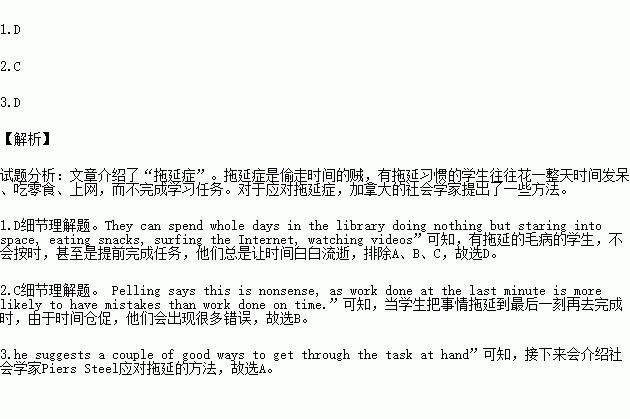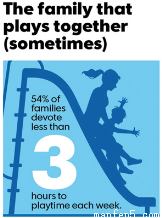题目内容
As the new semester begins, millions of college students across the country are trying hard to remember how best to write a paper or, more likely, how best to delay that paper.
Procrastination is the thief of time and a lot of students suffer form it. They can spend whole days in the library doing nothing but staring into space, eating snacks, surfing the Internet, watching videos and looking at other students sitting around them, who, most likely are doing nothing either.
Paralyzed (使失去活力) by their habit to procrastinate, they write micro blogs about their fears, asking their online friends if they sometimes have the same issue. But this does nothing to break the spell (魔咒).
According to a recent report, 95 percent of us procrastinate at some point and 20 percent of the world’s population are always procrastinating. The figures are disappointing. Procrastinators are less wealthy, less healthy and less happy than those who don’t delay. Procrastinators like to find excuses to justify their behavior, but BBC columnist Rowan Pelling says they are all wrong.
Many procrastinators tell themselves they are perfectionists who work best under pressure. Pelling says this is non sense, as work done at the last minute is more likely to have mistakes than work done on time. The behavior of procrastinators often makes them feel ashamed, inconveniences others and annoys loved ones.
Pelling also points out that procrastination feels particularly delinquent(过失的) in a society that thinks of speedy action as admirable, and, at times, even as a moral good.
Fortunately, social scientists have thrown their weight behind efforts to understand this behavioral mistake and offer strategies to control it. Piers Steel, a Canadian social scientist and author of The Procrastination Equation, believes human is “designed” to procrastinate. Nevertheless, he suggests a couple of good ways to get through the task at hand.
1.Which behavior belongs to procrastination?
A. Never dream away the time.
B. Always complete the tasks ahead of time.
C. Never put off till tomorrow what should be done today.
D. Always wait to work until the “good mood” or “good time”.
2.According to the passage, which of the following statements is NOT TRUE?
A. Procrastination makes people waste their time.
B. Speedy action is considered as a moral standard in the society.
C. procrastinators usually complete their tasks perfectly.
D. Procrastination is common among people.
3.What is most likely to be discuss ed in the paragraph that follows?
ed in the paragraph that follows?
A. Ways to handle the study pressures.
B. Introduction to the book The Procrastination Equation.
C. More examples to illustrate procrastination
D. Measures to deal with procrastination.
 冲刺100分单元优化练考卷系列答案
冲刺100分单元优化练考卷系列答案


